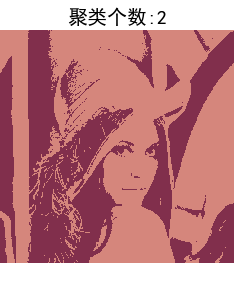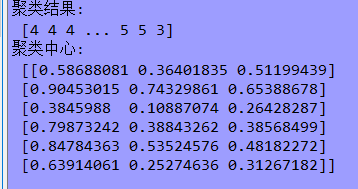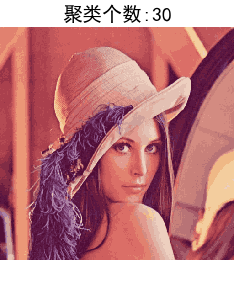Python图像识别(聚类)
1 # -*- coding: utf-8 -*- 2 """ 3 Created on Fri Sep 21 15:37:26 2018 4 5 @author: zhen 6 """ 7 from PIL import Image 8 import numpy as np 9 from sklearn.cluster import KMeans 10 import matplotlib 11 import matplotlib.pyplot as plt 12 13 def restore_image(cb, cluster, shape): 14 row, col, dummy = shape 15 image = np.empty((row, col, dummy)) 16 for r in range(row): 17 for c in range(col): 18 image[r, c] = cb[cluster[r * col + c]] 19 return image 20 21 def show_scatter(a): 22 N = 10 23 density, edges = np.histogramdd(a, bins=[N, N, N], range=[(0, 1), (0, 1), (0, 1)]) 24 density /= density.max() 25 x = y = z = np.arange(N) 26 d = np.meshgrid(x, y, z) 27 28 fig = plt.figure(1, facecolor='w') 29 ax = fig.add_subplot(111, projection='3d') 30 31 cm = matplotlib.colors.ListedColormap(list('rgbm')) 32 ax.scatter(d[0], d[1], d[2], s=100 * density, cmap=cm, marker='o', depthshade=True) 33 ax.set_xlabel(u'红') 34 ax.set_ylabel(u'绿') 35 ax.set_zlabel(u'蓝') 36 plt.title(u'图像颜色三维频数分布', fontsize=20) 37 38 plt.figure(2, facecolor='w') 39 den = density[density > 0] 40 den = np.sort(den)[::-1] 41 t = np.arange(len(den)) 42 plt.plot(t, den, 'r-', t, den, 'go', lw=2) 43 plt.title(u'图像颜色频数分布', fontsize=18) 44 plt.grid(True) 45 46 plt.show() 47 48 if __name__ == '__main__': 49 matplotlib.rcParams['font.sans-serif'] = [u'SimHei'] 50 matplotlib.rcParams['axes.unicode_minus'] = False 51 # 聚类数2,6,30 52 num_vq = 2 53 im = Image.open('C:/Users/zhen/.spyder-py3/images/Lena.png') 54 image = np.array(im).astype(np.float) / 255 55 image = image[:, :, :3] 56 image_v = image.reshape((-1, 3)) 57 kmeans = KMeans(n_clusters=num_vq, init='k-means++') 58 show_scatter(image_v) 59 60 N = image_v.shape[0] # 图像像素总数 61 # 选择样本,计算聚类中心 62 idx = np.random.randint(0, N, size=int(N * 0.7)) 63 image_sample = image_v[idx] 64 kmeans.fit(image_sample) 65 result = kmeans.predict(image_v) # 聚类结果 66 print('聚类结果:\n', result) 67 print('聚类中心:\n', kmeans.cluster_centers_) 68 69 plt.figure(figsize=(15, 8), facecolor='w') 70 plt.subplot(211) 71 plt.axis('off') 72 plt.title(u'原始图片', fontsize=18) 73 plt.imshow(image) 74 # plt.savefig('原始图片.png') 75 76 plt.subplot(212) 77 vq_image = restore_image(kmeans.cluster_centers_, result, image.shape) 78 plt.axis('off') 79 plt.title(u'聚类个数:%d' % num_vq, fontsize=20) 80 plt.imshow(vq_image) 81 # plt.savefig('矢量化图片.png') 82 83 plt.tight_layout(1.2) 84 plt.show()
结果:


1.当k=2时:


2.当k=6时:


3.当k=30时:


总结:当聚类个数较少时,算法运算速度快但效果较差,当聚类个数较多时,运算速度慢效果好但容易过拟合,所以恰当的k值对于聚类来说影响极其明显!!



 浙公网安备 33010602011771号
浙公网安备 33010602011771号